The Best Songs of 2010: 25 to 16
I’d be remiss if I let 2010 go by without recognizing the year’s accomplishments in music because, wow, what a year. I admit that my enthusiasm probably owes something to the fact that writing about music professionally on a regular basis meant that I was exposed to more of it, but I honestly believe that 2010 stands equal or above to any other year that I’ve been paying attention to music. It was almost too much: the volume of great records combined with the accelerated Internet pace meant that keeping track was hard at the best of times (Did Contra and Transference really come out this year? They feel so old.)
So when the year feels like one impressive blur, it’s even more important to stop, take a deep breath and pull some songs and records out from the spin cycle and place them in privileged positions as the year’s best work.
2010: The Year in Songs
*Rather than restrict myself to officially-released singles, I opened this list to any song of significance. In other words: no obscure little favourites. Even if they weren’t a single, these were songs that lots of people heard, discussed and recognized as highlights within the artists’ respective work. In the interest of diversity, I also stuck to one song per artist.

A sweet outlier on an otherwise brash and abrasive electro-pop record, “Dissembler” is a small little breakup song whose appeal owes a great deal to the performance of Maylee Todd. In her lead vocal, backed by Dan Werb’s harmonies, the track transforms from a work of critical self-loathing and angst into a true duality, where we’re never really quite sure whose perspective we’re getting in the song. Like in most breakups, the fault lines blur.
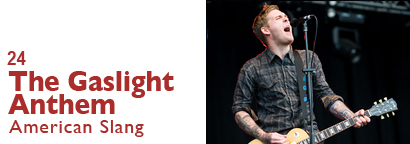
Some Gaslight Anthem songs make their subject matter abundantly clear. Some are more ethereal, as if the band is swimming in a sea of influences and ideas stretching back decades and are uninterested in finding solid ground; they’re content to float, aimless but comfortable. American Slang as as a whole echoes this settled unsettlement—in a wonderful, inviting way—but never better than on the title track, instantly dreamlike and familiar.

I’m not quite sure what the deal with Angela is, but as long as she continues to inspire Hamilton Leithauser to belt her complications with the full force of his raspy, throat-tearing voice, I hope she’s around to stay. After a pair of slower, more restrained records, hearing The Walkmen return to some of the barely-contained passion that defined their first couple of records was one of the year’s greatest thrills.
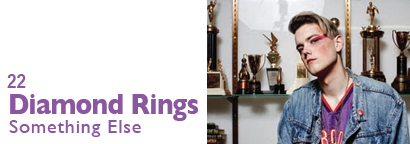
Toronto’s Diamond Rings is not fancy or showy with his wordplay, but there’s a wonderful precision to it. After all, even artful pop music needs to pop, and that means how it sounds is priority number one. “Something Else,” John O’s fourth single under the Rings name, makes each syllable sound amazing, simply by connecting it so closely to each beat. It’s as punchy as that great post-chorus guitar riff.
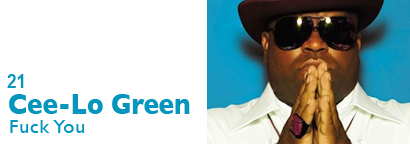
It’s funny that a song that’s only four months old is already in the third stage of its life (such is the Internet age, I suppose). After the initial euphoric thrill of Cee-Lo’s profane Motown throwback wore off, and subsequent to dealing with the “it was just a novelty” backlash, we’re now onto the “hey, this song is actually really great!” stage, which is a wonderful place for such a long-underrated performer to end up.
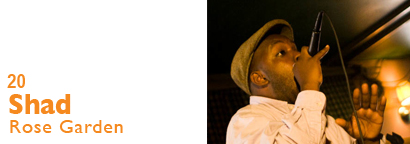
As hip hop becomes more and more singles-driven, it’s arguably harder than ever for album-driven rappers to reach a mass audience. Shad put out probably the best Canadian hip hop album this year—and easily one of the best North American ones too—and in a fairer world “Rose Garden” would have been a smash. Soulful and clever, its verses mash together Cee-Lo, Glenn Beck, Jack Bauer and “black power naps” before hitting with that memorable, swooning chorus.
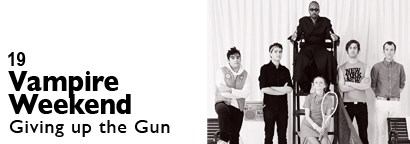
If Vampire Weekend’s self-titled debut was precise, Contra was downright robotic by comparison. If that sharp focus was a turnoff for some listeners, so be it; it allowed the band to stretch their sound while still holding to a catchy-as-hell centre. “Giving Up the Gun” uses a thundering, almost electronic bass riff and reverb-driven guitars to give the song a completely different sound than the band has worked with previously, but which still feels every bit as alive.
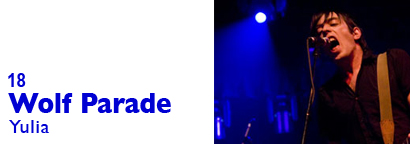
Despite a couple of Spencer Krug gems, Dan Boecker was the MVP of Expo 86, delivering its most vital, inspired tracks by bringing back the punky edge that kind of went missing on Kissing the Beehive. “Yulia,” an ode to Soviet cosmonauts being shot off into the unknown, is gloriously unkempt, keeping the excitement of the classic “Major Tom” narrative but with its dark edges kept sharp and on-display. Oh and the video is one of 2010’s best, easily.
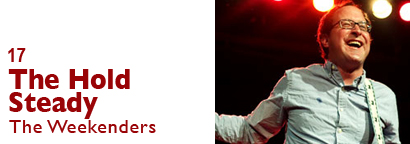
The drug-using, horse-betting protagonists of Boys and Girls in America’s “Chips Ahoy” aren’t the first Craig Finn characters to reappear a couple of albums after the fact, but their return in “The Weekenders” is compelling for how Finn uses them. His gaze has started to look backwards more than forwards as he gets older, so rather than the in-the-moment thrills of gambling and getting high, we get a nostalgic lament on the terms with which we re-engage our romantic past. And how, in the end, no one really learns the lesson.
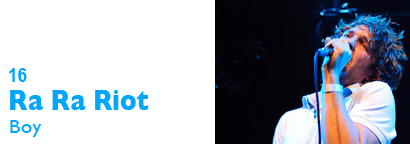
Yes, Ra Ra Riot play in Vampire Weekend’s sandbox, and don’t really make any bones about that (VW guitarist Rostam Batmanglij even mixed their record). But there’s something about “Boy” that struck me harder than any single track on Contra. Maybe it’s the sheer energy with which Wes Miles attacks that vocal line, or the way in which the bass and guitar riffs just seem to float in-and-out of the mix, giving a wonderfully fluid feeling to the operation.
Tomorrow: songs 15-12…
(From McNutt Against the Music. Follow McNutt on Twitter.)
Related on maisonneuve.org:
—Who Gets to Be Part of the Pop Music Canon?
—Ted Leo: Undisputed MVP of Matador at 21
—Top Ten Singles of the Decade
Subscribe — Follow Maisy on Twitter — Like Maisy on Facebook





